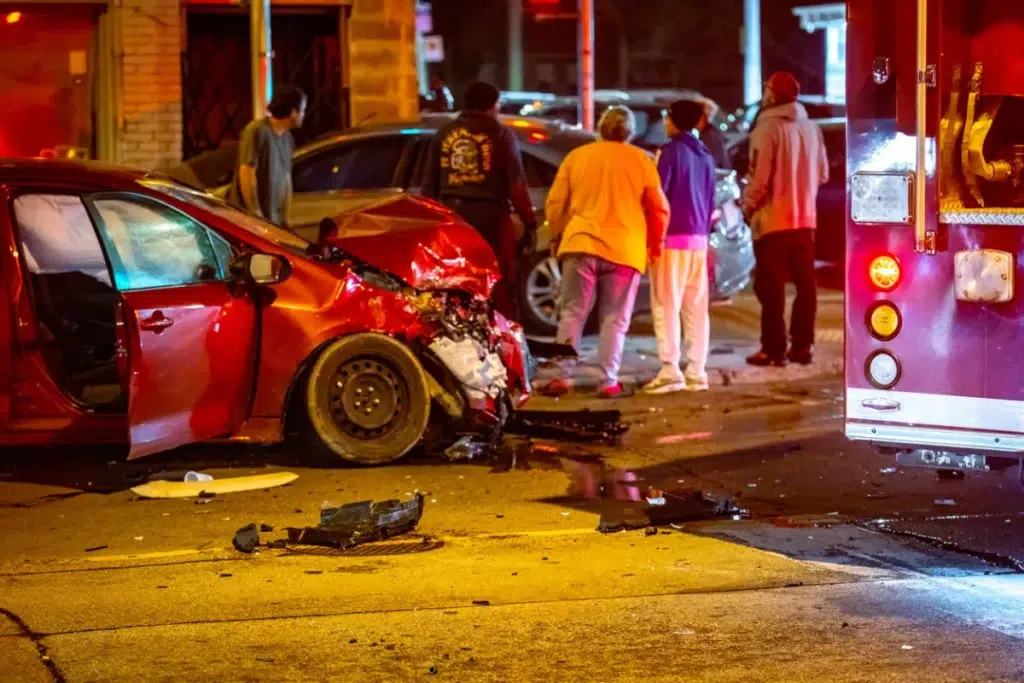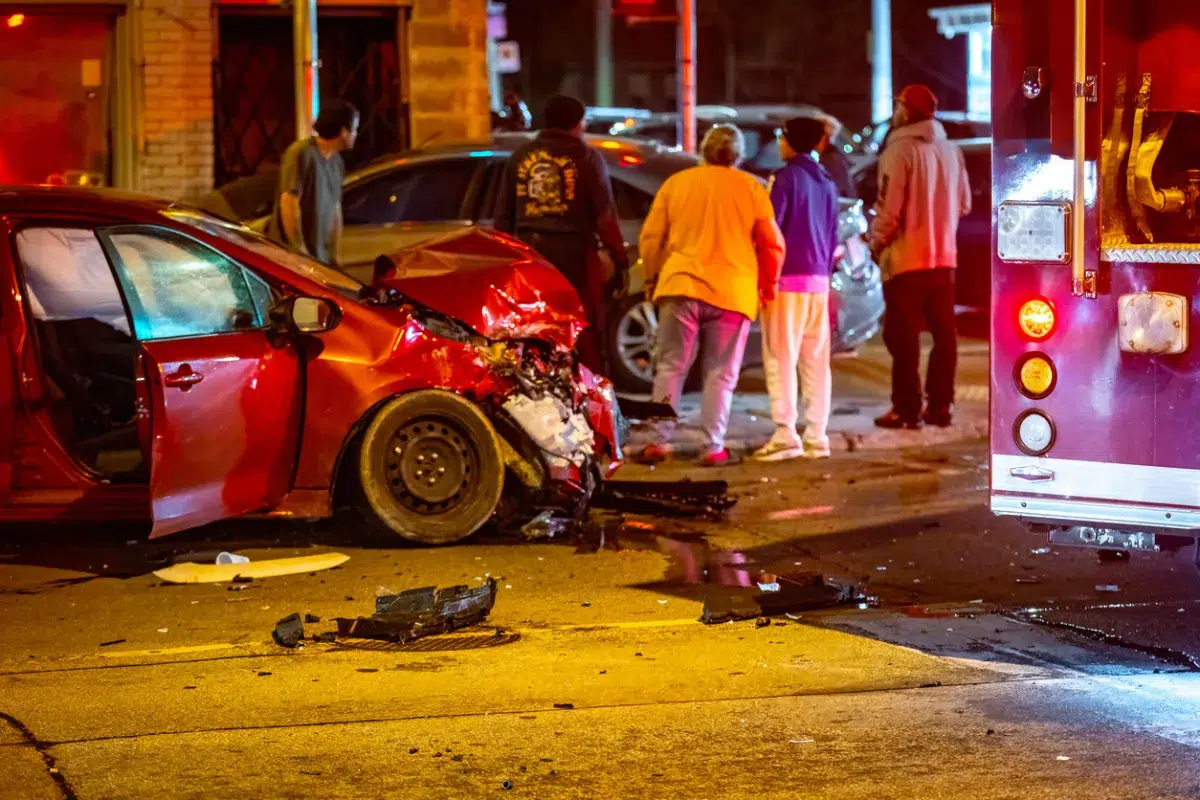
If you’ve been involved in a car crash in California, you’re likely wondering how to get more money from a car accident settlement. Between dealing with insurance companies and covering medical bills, lost wages, and pain and suffering, the stakes can feel incredibly high. The good news is that there are proven strategies to maximize your compensation.
Navigating a car accident claim can be overwhelming without the right legal guidance. That’s why working with a knowledgeable car accident lawyer in California can make all the difference. At Delfino Green & Green, we’re committed to helping injury victims secure the compensation they deserve.
This guide will walk you through key tips to increase your car accident compensation, explain what affects the value of a settlement, and offer actionable advice you can use immediately.
Understanding Car Accident Settlements
So, what exactly is a car accident settlement? In simple terms, a car accident settlement is a formal agreement where the at-fault party’s insurance company pays a sum of money to the injured party. In exchange for this payment, the injured party agrees to release the insurance company and the at-fault driver from any further liability related to the accident. Essentially, you are closing the case for a negotiated amount.
The car accident settlement process, however, is far from simple. It’s an intricate dance of negotiation, documentation, and legal strategy. Understanding the steps involved is crucial to ensuring you don’t leave money on the table.
Understanding how car accident settlements are calculated—and the many factors that influence them—is critical. Settlements in California can vary dramatically based on the nature and severity of the accident. Common influences include:
- Medical expenses (past and future)
- Lost income or reduced earning capacity
- Property damage
- Pain and suffering
- Emotional distress
- The clarity of the fault in the accident
Because the stakes are so high, it is essential to consult with a dedicated car accident lawyer who can guide you through every stage. An experienced attorney acts as your advocate, protecting you from the tactics of insurance companies and working tirelessly to maximize your car accident settlement in San Francisco and throughout California.
6 Essential Tips to Get More Money From a Car Accident Settlement Negotiation
When you’re trying to recover from an accident, the idea of fighting for a settlement can feel daunting. However, by taking the right steps from the very beginning, you can significantly strengthen your position and increase your potential compensation. Here are six essential tips to help you get the most from a car crash claim in California.
1. Evaluate Your Case and Establish Fault
Determining liability is the foundation of any successful car accident settlement. In California, the rule of pure comparative negligence means you can still recover damages even if you’re partially at fault, but your compensation will be reduced by your percentage of fault. That’s why a careful legal assessment is critical.
In-depth Tip: Don’t rely on your own assumptions or the other driver’s narrative. A qualified car accident lawyer can collect and analyze police reports, accident reconstruction data, surveillance footage, dashcam evidence, and eyewitness testimony. Establishing strong fault arguments early significantly improves your negotiating power.
2. Document All Damages Thoroughly
A successful car accident claim is built on a foundation of solid evidence. The more documentation you have, the stronger your case will be. You are the most important source of information for your claim. Start gathering evidence from the moment the accident occurs.
- At the Scene: If you are physically able, take photos and videos of everything: the position of the cars, the damage to all vehicles involved, skid marks on the road, traffic signals, weather conditions, and your visible injuries.
- Information Exchange: Get the names, contact information, driver’s license numbers, and insurance details of all other drivers.
- Witnesses: If there were any witnesses, get their names and phone numbers. An independent account can be invaluable.
- Police Report: Always call the police to the scene and ensure a report is filed. Obtain a copy of this report as soon as it’s available.
- Keep a Journal: Start a daily journal detailing your pain levels, physical limitations, emotional state, and how your injuries are affecting your daily life. This narrative will be powerful evidence when negotiating non-economic damages.
- Create a File: Keep every single piece of paper related to the accident in one place. This includes medical bills, receipts for prescriptions, repair estimates, and any correspondence from insurance companies.
In-depth Tip: Maintain a comprehensive accident journal. Log every doctor visit, physical therapy session, pharmacy receipt, travel expenses, and even modifications made to your home due to your injuries. For missed work, obtain employer letters and past pay stubs. Use photos to show vehicle damage and physical injuries over time. Proper documentation builds a bulletproof compensation case.
3. Seek Prompt and Continuous Medical Care
Delays or gaps in medical treatment can create the impression that your injuries weren’t serious or were unrelated to the crash. Insurance companies watch for these gaps and use them to justify lower offers—or deny claims altogether.
In-depth Tip: Go to the emergency room or urgent care immediately after the accident, even if symptoms seem minor. Follow all follow-up care instructions, attend physical therapy, and consult specialists when recommended. Keep a record of how your injuries affect daily living, such as sleep loss, inability to care for children, or emotional distress. These records bolster both economic and non-economic damage claims.
4. Do Not Give a Recorded Statement to the Other Driver’s Insurance
Soon after the accident, you will likely receive a call from the other driver’s insurance adjuster. They will be friendly and sound concerned, but it is critical to remember their primary goal: to pay out as little as possible. They will ask you to provide a recorded statement about the accident. You should politely but firmly decline.
Adjusters are trained to ask leading questions designed to get you to say something that can be used against you later. You might unintentionally downplay your injuries (“I’m a little sore, but okay”) or say something that could be twisted to imply you were partially at fault. You are under no legal obligation to give them a statement. The best response is to say, “I am not comfortable providing a statement at this time, and my attorney will be in touch with you.”
5. Don’t Accept the First Offer
Insurance companies are profit-driven businesses, and their first settlement offer is almost always a lowball figure. These offers are designed to resolve your claim quickly before you fully understand the extent of your damages.
In-depth Tip: Resist the pressure to accept fast money. Instead, request a written breakdown of how the insurer calculated the offer. Was pain and suffering included? What about lost earning potential? Present counter-evidence—such as updated medical bills or new diagnoses—to justify a higher demand. Let your attorney manage this back-and-forth to avoid saying something that could hurt your claim.
6. Hire an Experienced Car Accident Lawyer
Retaining the right attorney may be the single most important decision you make in the settlement process. Hiring an experienced personal injury lawyer offers significant benefits, including expert negotiation skills, thorough evidence gathering, and the ability to maximize your compensation. A seasoned car accident lawyer knows how to value your claim accurately, avoid common pitfalls, and push back against insurance tactics meant to diminish your payout.
In-depth Tip: Choose experienced personal injury lawyers or a reputable law firm with a proven track record in maximizing settlements and taking cases to trial when needed. Look for client testimonials, verdict histories, and willingness to invest in expert witnesses if necessary. Legal representation also levels the playing field—you’re no longer negotiating alone.
When deciding who to hire, consider personal injury lawyers and car accident lawyers who specialize in these cases and understand the complexities involved.
Consider the Long-Term Impact
Many car accident injuries don’t fully reveal themselves for weeks or even months. Common injuries from an auto accident include broken bones, neck injuries, internal injuries, spinal cord injury, traumatic brain injuries, and brain injuries. Even minor injuries can have lasting effects and require medical attention. Quick settlements rarely account for future surgeries, rehabilitation, chronic pain, ongoing medical costs, or permanent limitations in mobility or work capacity. Severe injuries, serious injuries, and more severe injuries can require extensive rehabilitation and significant medical costs, sometimes involving a physical therapist to aid in recovery. Settling too soon can leave you paying out of pocket later.
In-depth Tip: Have your attorney coordinate with medical and vocational experts to estimate the cost of ongoing care, job retraining, or long-term disability. Include these projections in your demand letter along with a life-care plan if your injuries are severe. Addressing future damages proactively ensures you’re compensated for the full scope of harm, including physical and emotional pain, not just your immediate expenses.
Calculating Damages and Compensation
As mentioned, calculating the full scope of your damages is a critical step, and doing so requires a thorough understanding of how insurance companies and courts value different types of losses. To ensure you’re receiving fair compensation, it’s essential to examine three core components: economic damages, non-economic damages, and insurance policy limits.
- Economic Damages: These are objective, quantifiable financial losses resulting from the accident. They typically include:
- Emergency medical services, hospital stays, surgeries, diagnostic tests (X-rays, MRIs)
- Ongoing treatment such as physical therapy, pain management, and specialist visits
- Prescription medications and medical equipment (e.g., crutches, braces, wheelchairs)
- In-home care and assistance if you are temporarily or permanently disabled
- Lost income from missed work and diminished future earning capacity
- Property damage, including repair or replacement of your vehicle
- These damages are documented using medical bills, receipts, employment records, and vehicle repair estimates. The more complete and organized your documentation, the easier it is to substantiate these claims.
- Non-Economic Damages: These are subjective losses that cannot be easily calculated but significantly impact your quality of life. Examples include:
- Physical pain and chronic discomfort
- Emotional distress, anxiety, or depression caused by the trauma of the accident
- Loss of enjoyment of life (e.g., inability to engage in hobbies or activities)
- Loss of consortium (negative impacts on relationships and companionship)
- In California, there is no cap on non-economic damages in most personal injury claims. However, insurers may undervalue these losses unless you provide compelling evidence, such as journal entries, therapist reports, and testimony from family or friends.
- Policy Limits: Even when your damages are substantial, the insurance company is only obligated to pay up to the amount specified in the at-fault party’s policy. For example, if the driver who hit you has $50,000 in bodily injury coverage, that’s the maximum the insurer is liable to pay, regardless of whether your losses total $100,000 or more. A skilled attorney may help you seek additional compensation through underinsured motorist coverage, third-party liability, or filing a lawsuit.
To get a rough idea of your claim’s potential value, you can use a [personal injury settlement calculator tool], but understand that these tools often oversimplify complex cases. They typically don’t account for long-term medical needs, pain and suffering, or nuanced liability issues. The most accurate way to assess your damages is by working with an experienced car accident lawyer who can provide a customized valuation based on every detail of your case.
Negotiating a Settlement
The negotiation phase in car accident cases begins after your lawyer submits a comprehensive demand letter to the insurance company. This letter outlines the facts of the case, establishes the other party’s liability, details all your damages with supporting documentation, and demands a specific settlement amount.
Insurance adjusters will review the packet and respond with a counteroffer, which is almost always significantly lower than your demand. This is normal. Settlement negotiations then take place, and this is where the skill of a seasoned negotiator becomes invaluable.
How do you respond to a low settlement offer?
The best response is to let your lawyer handle it. A low offer will not rattle an experienced top settlement attorney. They will respond with a counteroffer of their own, systematically dismantling the adjuster’s arguments and reinforcing the strengths of your case with the evidence they have gathered. This back-and-forth process can continue for several rounds. A good lawyer knows the value of your claim and will not be pressured into accepting an unfair amount. Their goal is to secure the most money possible for you, ensuring you receive fair compensation for your injuries and losses.
Working with Insurance Companies
Dealing with insurance companies can be one of the most frustrating aspects of a car accident claim. It’s a business, and their goal is to protect their profits by minimizing payouts.
How Do Insurance Companies Determine Payout?
Insurance companies rely on a combination of internal guidelines, software algorithms, and human discretion to evaluate car accident claims. The process typically begins with an adjuster reviewing available evidence, including accident reports, medical records, and witness statements. The adjuster assesses liability—who was at fault and to what degree—and determines the nature and extent of your injuries.
To standardize settlement offers, many large insurers use proprietary software like Colossus. This program processes coded data such as diagnostic codes, treatment duration, and reported symptoms. The adjuster inputs this information, and the software generates a claim value based on comparable historical cases. However, this system often emphasizes objective data while downplaying or overlooking subjective but critical factors like ongoing pain, psychological trauma, and disruptions to your daily life.
Moreover, the software tends to assign lower weight to ‘soft tissue injuries’ and may not account for long-term complications or unique circumstances that elevate the value of your claim. While this can make the claims process more efficient for insurers, it frequently results in undervaluation of claims, especially for non-economic damages.
Experienced attorneys know how to challenge these formulaic valuations. They provide countervailing evidence such as medical expert reports, detailed personal narratives, and day-in-the-life videos to compel the adjuster to reassess the case outside the rigid algorithm.
Actionable Tip: Don’t settle based on a software-generated estimate. Supplement your claim with strong, personalized documentation and let your lawyer present your case as a compelling human story, not just a data point.
Understanding Your Rights and Legal Options
After a car accident, it’s essential to understand that you are not limited to accepting a settlement offer, especially if it does not fairly reflect your injuries and losses. As an injured party, you are legally entitled to pursue compensation through various channels, including direct negotiations, alternative dispute resolution (ADR), or a formal personal injury lawsuit. If the insurer delays, denies your claim in bad faith, or fails to make a fair offer, filing a lawsuit may be your most viable option to recover adequate compensation. In California, it is crucial to file a personal injury lawsuit within the legal deadline (statute of limitations) to protect your right to seek compensation.
California law allows personal injury victims to seek not only economic and non-economic damages but also, in rare cases, punitive damages when the defendant’s conduct was especially reckless or malicious. Your legal options also include filing claims against multiple liable parties (e.g., negligent drivers, employers, vehicle manufacturers), pursuing compensation through underinsured/uninsured motorist coverage if the at-fault driver lacks sufficient insurance, or bringing a wrongful death claim if a loved one has died as a result of the accident.
Actionable Tip: Schedule a case strategy meeting with your personal injury attorney to review all potential legal routes. Ask whether alternative options like arbitration, mediation, or direct litigation would best serve your case given your timeline, damages, and the insurer’s behavior.
Going to Trial
While more than 95% of personal injury cases are settled out of court, the willingness to go to trial is sometimes necessary to get justice. This is especially true when liability is contested, damages are substantial, or the insurer is unwilling to negotiate in good faith. At trial, a judge or jury will assess the credibility of witnesses, expert testimony, medical evidence, and accident reports to determine fault and award damages.
Trials are inherently riskier than settlements but can also produce much higher awards, particularly when jurors empathize with a plaintiff’s suffering. However, they require careful preparation, including formal discovery, depositions, expert consultations, and pre-trial motions.
Actionable Tip: Prepare for litigation from day one. Preserve every shred of evidence, attend all medical appointments, and keep a consistent injury log. A well-prepared case—even if it never goes to trial—signals strength and can pressure insurers to offer significantly more during negotiations.
Hiring an Experienced Lawyer
The data is clear: claimants who hire a car accident attorney consistently receive significantly higher settlements than those who represent themselves. Hiring an experienced car accident attorney levels the playing field, especially when dealing with San Francisco car accidents. The insurance company has a team of adjusters and lawyers working for them; you deserve to have a dedicated professional in your corner who understands the complexities of local traffic laws and accident circumstances.
When looking for representation, seek a firm that specializes in personal injury and San Francisco car accidents. Look for a track record of success and positive client testimonials. At Delfino Green & Green, we offer a free consultation and work on a contingency fee basis. This means you pay no upfront fees, and our lawyer only gets paid if they win a settlement or verdict for you.
How do lawyers negotiate settlements?
Lawyers negotiate from a position of strength. They use the comprehensive evidence they’ve gathered as leverage. They highlight inconsistencies in the other driver’s story, cite relevant legal precedents, and emphasize the severity of your injuries with expert testimony. Their most powerful tool, however, is the credible threat of taking the case to trial. Insurance companies know that a jury trial is expensive and unpredictable, and they are often more willing to offer a fair settlement to avoid it.
Common Mistakes to Avoid
In the chaotic period after a motor vehicle accident, accident victims can easily make mistakes that could jeopardize their claim. Here are some of the most common pitfalls to avoid:
- Admitting Fault: Never apologize or admit any fault at the scene, even to be polite.
- Posting on Social Media: Insurance investigators will scour your social media profiles. A photo of you smiling at a family barbecue could be used to argue you aren’t really in pain. It’s best to stay off social media entirely until your case is resolved.
- Failing to Follow Doctor’s Orders: Not following your treatment plan can be interpreted as a sign that your injuries aren’t serious.
- Settling Too Quickly: As discussed, never accept the first offer without speaking to an attorney.
- Missing the Deadline: Be aware of the two-year statute of limitations and act promptly.
- Underestimating Injuries from Minor Car Accidents: Even minor car accidents can cause significant injuries or vehicle damage. Don’t ignore symptoms or delay seeking medical attention, as this can impact your health and your ability to recover compensation.
Conclusion and Next Steps
Receiving a fair and just car accident settlement requires patience, persistence, and, most importantly, the right professional guidance. By seeking immediate medical care, meticulously documenting every detail, and understanding the full value of your claim, you lay the groundwork for success.
The single most impactful step you can take to get more money from a car accident settlement is to partner with a skilled and compassionate legal team. A qualified California car accident lawyer will champion your rights, navigate the complex legal and insurance systems, and fight for the maximum compensation you deserve while you focus on what truly matters: your health and recovery.
Remember, you have the right to seek justice. If you or a loved one has been injured in a car accident, don’t settle for less than your claim is worth. Contact the experienced legal team at Delfino Green & Green today for a free, no-obligation consultation to discuss your case and learn how we can help you secure the future you deserve.
Disclaimer: This content is for informational purposes only and does not constitute legal advice. For personalized legal assistance, please contact Delfino Green & Green directly.



